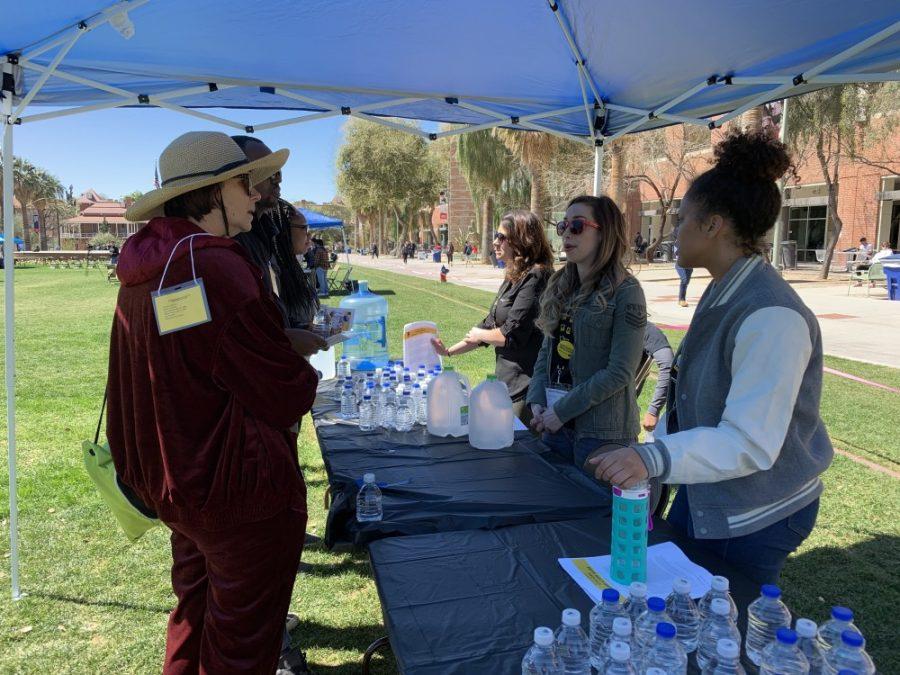The second annual “Walk a Mile in a Refugee’s Shoes” simulation event took place Thursday afternoon on the University of Arizona Mall.
The International Rescue Committee, We Are All America and the UA College of Social and Behavioral Sciences Human Rights Practice collaborated to put the event together.
RELATED: Two UA professors study shifting public opinion toward migrants
The event featured a multitude of different speakers, including Jonathan Rothschild, the mayor of Tucson; Ming Holden, author of the book “Refuge,” and Steve Farley, former Arizona state senator.
Senada Kadich was one of the speakers and is the Senior Program Manager for the IRC. She is also a refugee from Bosnia. She and her son came to the U.S. in May 1997.
“I’m really thankful to all these volunteers and people helping us. Everything looks great,” Kadich said.
Kadich said she hoped people can learn more about the struggles refugees have been going through for many years by coming to the event and that it inspires people to help the refugees that come to Tucson.
The simulation aspect of the event was found at the different simulation stations along the Mall, where attendees could learn about what life is like for refugees. The stations covered different topics, such as food, borders, education, shelter and water.
Imani Cruz was one of the IRC members working at the water station. They would have attendees carry large jugs of water around the area to simulate refugees journeying to wells and other sources to find water. They are then shown what their portion of the collected water would be, which is the size of a small water bottle.
“We’re just trying to simulate how in refugee camps access to water is a huge issue and how important that issue is in people’s lives,” Cruz said. “Not even just lack of water, but the fact that the water can be very contaminated; it can be full of different diseases that affects their medical health.”
Each water bottle was marked with a different letter on the cap, which represented the different possible diseases that could be contracted from some of the water. Cruz said contamination of the water collected by refugees is a very common and serious issue.
“We’re trying to show people that refugee camp life is not a sustainable solution. It’s not permanent, and it should be something that’s very temporary and made better but at the end should have a more permanent solution for these people,” Cruz said.
The event was also home to many special vendor booths where attendees could buy products made by and supporting refugees while learning more about different refugee organizations and the work they do. The booths were set up by a number of organizations in Tucson that work to support refugees.
Erica Andres is a senior communications major at UA. Andres currently interns at the IRC and has volunteered there since last year through the UA Refugee Project. She wanted to get involved with a large event and decided to work with the refugee simulation event. She is writing her honors thesis on the IRC and the event.
“I want [people] to get a perspective of the hardships refugees have to go through,” Andres said. “I feel like the Tucson community is unaware of a lot of the situations that are going on politically. Unfortunately, a lot of budgets have been cut for resettlement agencies, and we’re hoping to change the outlook on the title ‘refugee.'”
RELATED: “Street medicine” class teaches students how to treat the homeless
Last year, the event was held at the Tucson Jewish Community Center, but was moved to the UA after feedback from people that went to the event.
“When we looked at survey results from last year some people were recommending, ‘Hey, U of A would be awesome to do,'” Andres said. “So I talked to Nejra Sumic, who is part of We Are All America, and she suggested that we work alongside U of A and International Rescue Committee and see if we can get together a huge event on campus to reach out to our students as well.”
Kadich said she and the other organizers look forward to the chance to put the event on again next year.
Follow Quincy Sinek on Twitter









